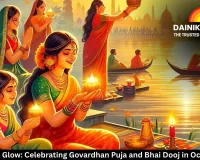Spiritual Harmony and Festive Fervor: India's Religious Landscape in Late 2025
Digital Desk
A message of universal oneness from a revered saint's centenary and the observance of traditional festivals highlight the diverse and vibrant spiritual life of the country this October.
In a week marked by both solemn remembrance and vibrant festival observance, India's rich spiritual tapestry is on full display, showcasing a unique blend of philosophical introspection and living traditions.
In a significant event for the spiritual and social landscape of Kerala, the President of India, Droupadi Murmu, inaugurated the observance of the Mahasamadhi centenary of Sree Narayana Guru at Sivagiri Mutt, Varkana on October 23, 2025.
Speaking at the occasion, the President honored the Guru as one of India's great spiritual leaders and social reformers, a saint and philosopher who devoted his life to "liberating people from the darkness of ignorance and superstition". She emphasized his powerful message of "One Caste, One Religion, One God for Mankind," a vision that went beyond the boundaries of religion, caste, and creed.
President Murmu stated that Sree Narayana Guru's teachings, which emphasized that real liberation comes from knowledge and compassion rather than blind faith, are profoundly relevant today. "Sree Narayana Guru’s message of unity reminds us that all human beings share the same divine essence," she said, adding that his call for oneness offers a "timeless solution to the conflicts faced by humanity".
Nagula Chavithi: Honoring the Serpent Gods for Family Well-Being
Coinciding with this national event is the regional festival of Nagula Chavithi, observed primarily in Andhra Pradesh and Karnataka on October 25, 2025. This auspicious day is dedicated to the worship of Nag Devtas (Serpent Gods).
The festival holds immense significance for married women, who observe strict fasts and perform special pujas, offering milk and sweets to the serpent deities for the longevity and well-being of their children. The puja muhurat, or auspicious time for worship, falls between 10:58 AM and 1:12 PM.
Beyond family prosperity, the ritual is also performed for protection and to seek relief from astrological afflictions. In Hindu astrology, Nagas represent the planets Rahu and Ketu, and worshipping them is believed to mitigate their harmful effects and bring harmony to the household.
A Continued Legacy of Interfaith Dialogue
The contemporary messages of unity find a deep resonance in India's long history of spiritual thought. The ongoing relevance of interfaith harmony was a cornerstone of the philosophy of Swami Vivekananda, whose historic 1893 speech at the World's Parliament of Religions in Chicago proclaimed, "I am proud to belong to a religion which has taught the world both tolerance and universal acceptance. We believe not only in universal toleration, but we accept all religions as true".
This ethos was later echoed by spiritual leaders like Pramukh Swami Maharaj, who in a 2000 address at the United Nations Peace Summit, advocated for a world where all religions are united, stating, "Let us guide ourselves and our followers not just to tolerate but to respect other religions, not just to exist but to co-exist".
The Road Ahead
As the nation moves forward, these events underscore a continuous dialogue between preserving ancient traditions and applying their core universal values to modern challenges. The centenary of Sree Narayana Guru serves as a nationwide reminder of the power of social equality and spiritual oneness, while festivals like Nagula Chavithi illustrate the enduring nature of localized faith practices that bind communities and generations together.
This period in India's cultural calendar demonstrates that the country's spiritual identity is not a monolith but a dynamic, living entity—one that finds strength in its diversity and timeless wisdom in its pursuit of unity.











